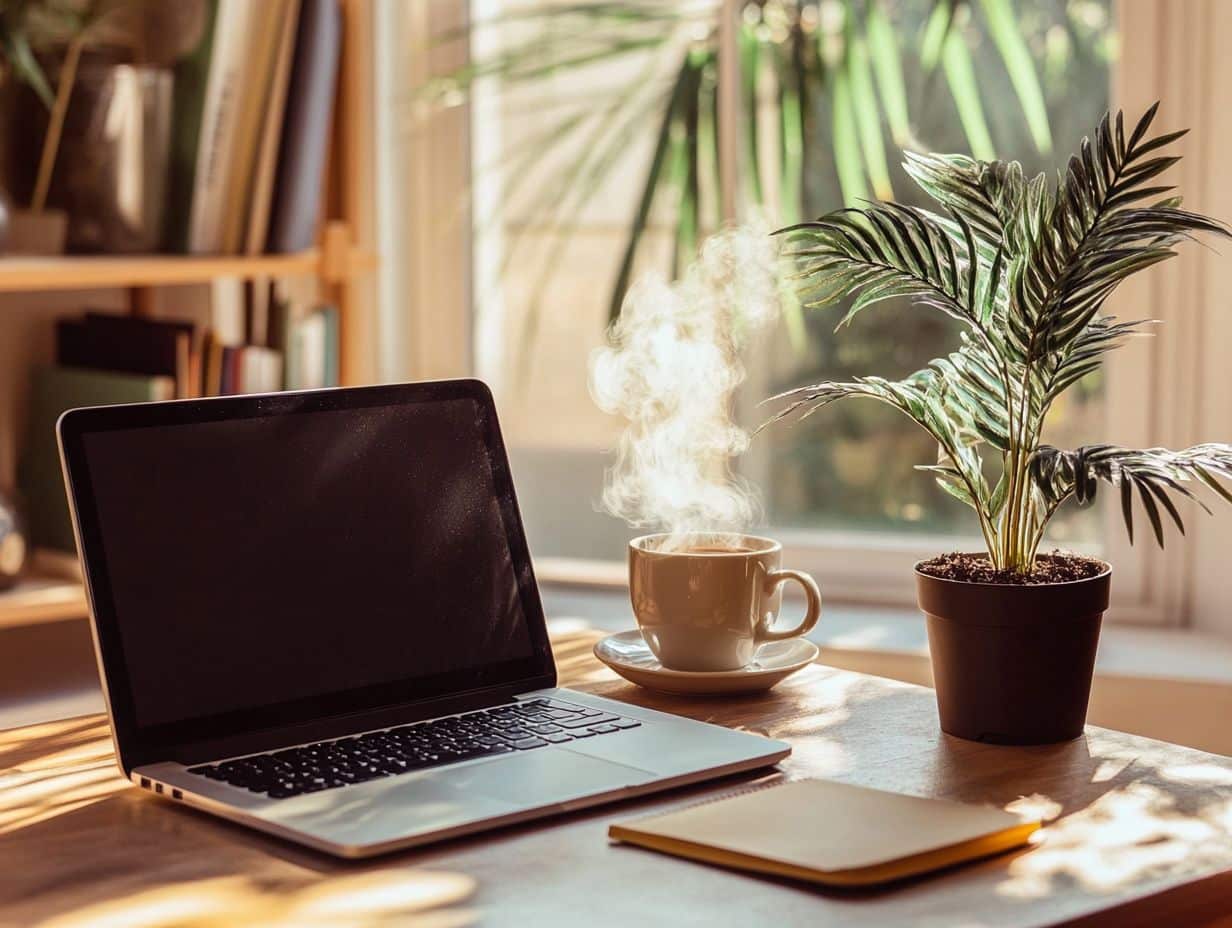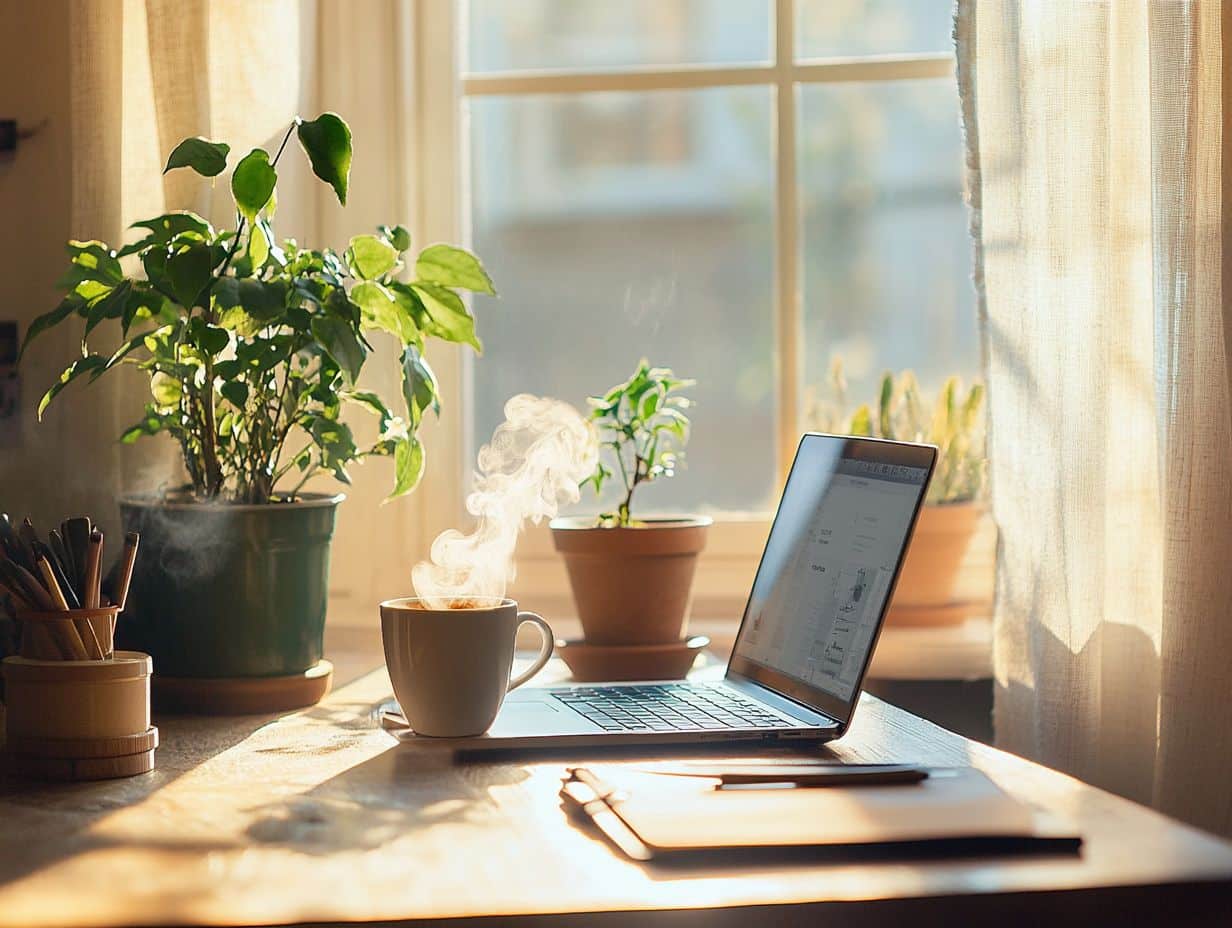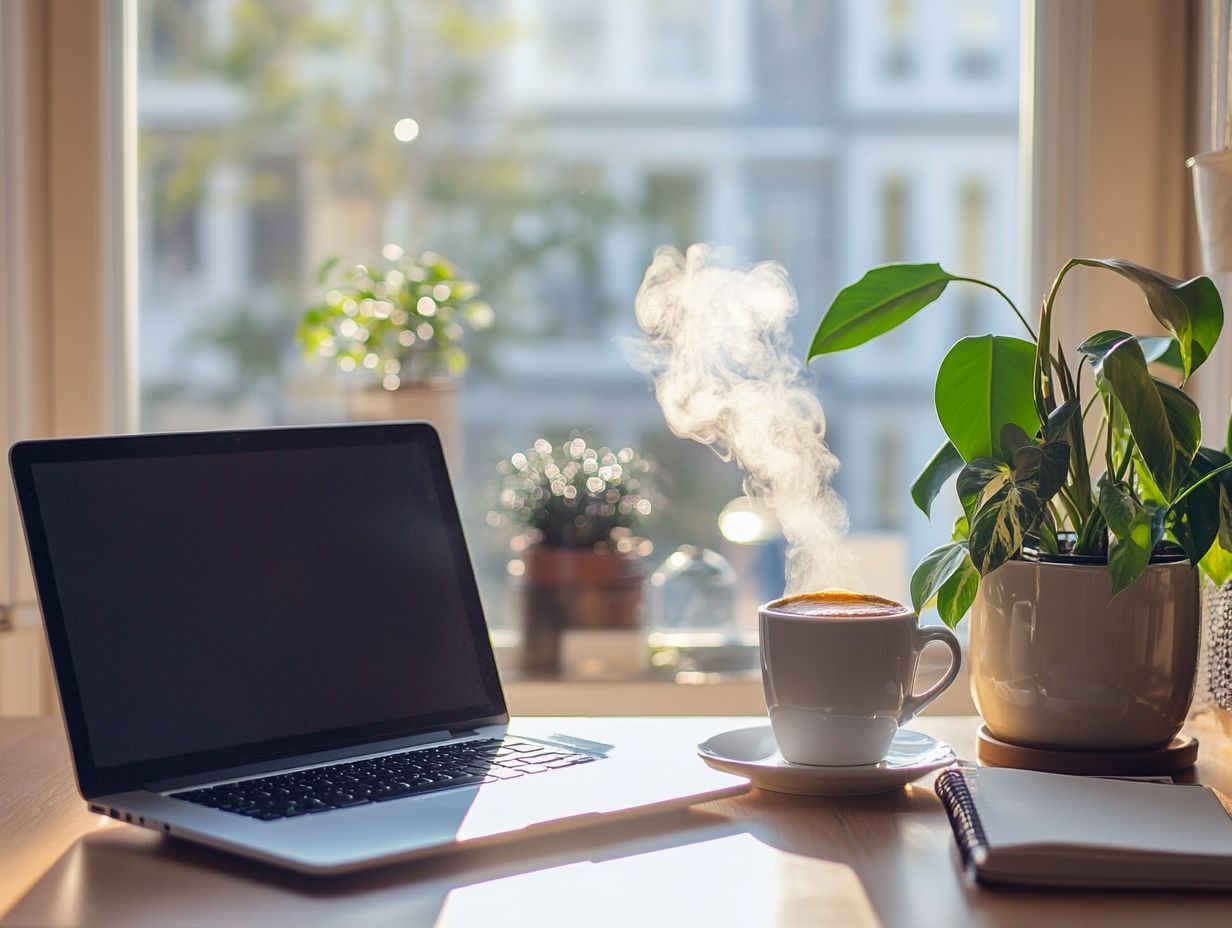In today s fast-paced world, I find that understanding personal productivity is more important than ever. It s not just about getting things done; it s about how well I manage my time and resources to reach my goals.
This article dives into the idea of personal productivity, why it matters for both individuals and organizations, and the different factors that play a role in it. I ll cover practical strategies for improvement, tools to measure productivity, and ways to maintain those productive habits.
Whether I m trying to amp up my efficiency at work or just in my daily life, this guide offers some valuable insights and actionable tips.
Understanding Personal Productivity

Understanding personal productivity feels like uncovering a treasure chest full of tips and tricks that really help me manage my time, set goals through goal setting, and get things done effectively.
In today s fast-paced world, I ve realized that mastering personal productivity is crucial for my personal development and getting things done at work. By sharpening my efficiency and focus, I can boost my performance, keep my motivation up, and build self-discipline while managing my cognitive load.
Whether I’m a student juggling assignments, an employee racing against deadlines, or an entrepreneur juggling a million tasks, getting a grip on personal productivity can make a huge difference in my output and overall well-being through efficient task prioritization and effective work habits.
Defining the Concept
Defining personal productivity for me starts with getting a grip on all the different components that play a role, like goal setting, effective planning, and habit formation. It s not just about ticking things off a to-do list; it s about managing my tasks in a way that aligns with my personal goals while making the most of my daily routines, which helps in my process improvement and self-optimization.
By putting these elements front and center, I can create a structured approach that boosts my efficiency and gives me that satisfying sense of accomplishment. Using SMART goal-setting techniques helps me clarify what I m aiming for, while task management systems like the Eisenhower Matrix or Kanban boards really help streamline my workflow and enhance my productivity metrics.
When I integrate planning methods like time blocking, I can allocate my resources and time more effectively, cutting down on distractions. Plus, I love using various tools and productivity apps to track my progress and keep my focus sharp, which ultimately enhances both my personal and professional effectiveness.
The Importance of Personal Productivity
I can t stress enough how important personal productivity is; it really is the foundation for success in both my personal and professional life, fostering a culture of continuous improvement.
When I boost my productivity, I not only hit my personal goals but also help make my workplace more efficient. Taking a results-oriented approach allows me to get the most out of my efforts and create meaningful outcomes for both my personal development and my organization.
In the end, it all leads to a more balanced and fulfilling life.
Benefits for Individuals and Organizations
The benefits of personal productivity go way beyond just what I accomplish on my own; they really make a difference for both me and my organization, enhancing collaboration and establishing a productivity culture. When I improve my efficiency, it helps in tracking my performance better, keeps my motivation levels high, and sharpens my organizational skills through effective project management. These outcomes not only boost my effectiveness but also create a collaborative work environment that values work-life balance and open communication.
For example, when I and my teammates prioritize our tasks effectively, using a prioritization matrix, we help projects flow more smoothly, which is a win for the whole organization. Take a look at someone who manages their time well to hit deadlines; it not only boosts their confidence but also sends a positive vibe throughout the team, enhancing workplace dynamics.
As motivation ramps up in the workplace, I notice that everyone feels more engaged, which sparks creativity and innovation, ultimately leading to better performance improvement. By honing my organizational skills, I streamline my workflows and reduce stress through effective energy management, setting both myself and my team up for success. This creates a workplace culture where productivity thrives, and we can all meet our goals more easily, promoting a strong achievement mindset.
Factors Affecting Personal Productivity
I ve come to realize that understanding what affects my personal productivity means looking at both the internal and external influences, like distractions, that can either boost or derail my efficiency and focus.
Internal factors, like how I manage my energy and the cognitive load I m carrying, really shape my ability to concentrate and affect my overall performance metrics. On the flip side, external factors, like distractions in my environment, can seriously mess with my task completion and overall productivity. It s all about finding that balance and ensuring a conducive work environment!
External and Internal Factors

External and internal factors really shape my productivity levels and influence my decision-making processes. For example, I notice my energy can fluctuate depending on different conditions, and the way I set up my environment can either enhance my concentration or throw me off track completely.
It’s important for me to pinpoint what causes these ups and downs so I can manage them better. Making sure I get enough sleep, stay hydrated, and eat well can really give my energy levels a boost, leading to more productive days and better mental clarity.
On the flip side, when my workspace is cluttered, it can create unnecessary stress and distract me from what I actually need to get done, impacting my workflow optimization. To tackle this, I try to keep everything organized by decluttering regularly and using tools like planners or digital task management lists.
I ve also found that taking a few moments for mindfulness exercises or deep-breathing techniques really helps me relieve stress and improve my concentration, making it easier to focus on my tasks. By being proactive about these factors, I can elevate my productivity and hit my goals more efficiently, ensuring continuous improvement in my work habits.
Strategies for Improving Personal Productivity
Implementing effective strategies for improving my personal productivity can really change how I tackle daily tasks and enhance my overall performance. It helps me make the most of my time management skills and reach my goals through consistent goal tracking.
By using planning techniques and setting SMART goals, I can boost my efficiency and prioritize tasks that align with what I’m ultimately trying to achieve.
Effective Time Management
Effective time management is my secret weapon for personal productivity, allowing me to create actionable plans. It helps me allocate my time wisely and keep procrastination at bay, reinforcing my self-discipline. Techniques like time blocking and scheduling are game-changers for organizing my tasks and ensuring I stay focused on what’s really important, optimizing my daily routines.
By using these strategies, I can create a structured yet flexible approach to my daily activities while maintaining mental clarity and focus. For example, time blocking allows me to set aside dedicated periods for specific tasks, which cuts down on distractions and boosts the quality of my work while enhancing my attention management. Having a clear schedule helps me avoid feeling overwhelmed and lets me take proper breaks essential for keeping my energy up and maintaining my resilience.
To tackle procrastination, I often turn to methods like the Pomodoro Technique, which helps me minimize barriers to productivity. This involves working in focused bursts followed by short breaks, ensuring I stay engaged and motivated. Plus, I love using productivity tools like task management apps and timers to enhance my accountability and track performance metrics. They really keep me accountable, helping me maintain focus and track my progress effectively, contributing to my self-assessment and continuous improvement.
Goal Setting and Prioritization
Goal setting and prioritization are crucial for my personal productivity and overall performance enhancement. They help me create actionable plans and get things done efficiently through effective time allocation. By using prioritization methods and setting SMART goals, I can effectively direct my efforts toward achieving meaningful results and evaluating my progress.
These strategies not only clarify my objectives but also break them down into manageable steps, which makes it so much easier to stay focused on my outcomes and align my efforts. For instance, when I use the SMART criteria Specific, Measurable, Achievable, Relevant, and Time-bound I can clearly define what success looks like for me, shaping my intention setting.
Implementing action plans with tools like the Eisenhower Matrix really helps me figure out what s urgent versus what s important in the context of my overall productivity framework. This conscious prioritization lets me tackle high-impact projects first, which gives me a sense of accomplishment and keeps me motivated to keep progressing toward my overall vision of success.
Eliminating Distractions
Eliminating distractions is super important for me to stay focused and get my work done efficiently, enhancing my work organization. I like to use attention management techniques, like mindfulness practices and setting clear boundaries, to create an environment that helps me concentrate and minimizes interruptions, supporting my focus strategies.
One strategy that really works for me is establishing specific work periods where I cut down on distractions, incorporating time allocation to maximize my productivity. This means turning off notifications on my devices or using apps that block those pesky distracting websites for a set amount of time, ensuring I maintain my concentration.
I also find that practicing mindfulness techniques, like taking a few minutes to focus on my breath or doing a quick meditation, can really help ground my mind and sharpen my attention, which is essential for stress management.
Another thing I do is organize my workspace to reduce clutter, which is crucial for maintaining mental clarity. A clean and orderly environment really promotes clarity and focus, facilitating better decision-making. I ve noticed that making small, consistent changes can lead to big improvements in my concentration over time, reinforcing my commitment to self-improvement.
Measuring and Tracking Personal Productivity

Measuring and tracking my personal productivity is crucial for understanding how I’m performing and spotting areas where I can keep improving. By using productivity metrics and feedback tools, I can hold myself accountable and make the adjustments I need to boost my effectiveness.
Tools and Techniques
Using the right tools and techniques can really amp up how I measure and track my personal productivity. From productivity apps to performance tracking methods, these resources help me optimize my workflow and keep my tasks in check. I also find that efficiency tools significantly contribute to my task management.
When I integrate various time tracking apps, I can see exactly where my time goes, which lets me make data-driven decisions for managing my tasks in the future. Tools like Toggl or Harvest give me detailed reports that highlight my work habits, while other apps help me prioritize tasks and set SMART goals.
Plus, incorporating techniques like the Pomodoro Technique helps me break my work into manageable chunks, keeping my focus sharp and minimizing burnout. By leveraging these technologies, I can streamline my processes, making work more efficient and ultimately boosting my productivity through better task execution.
Maintaining Personal Productivity
I ve found that keeping my personal productivity on track takes a proactive approach. It s all about building habits and daily routines that really support my personal goals.
By regularly reflecting on what s working and honing in on forming good habits, I can steer clear of burnout and keep my productivity levels up consistently over time. This practice of reflection is crucial for continuous improvement.
Sustaining Habits and Routines
Sustaining my habits and routines is key to keeping my personal productivity in check; they really lay a solid foundation for everything I do each day. By honing in on habit formation and taking personal responsibility, I can build effective routines that work towards my productivity goals and task prioritization.
These routines help me develop self-discipline, allowing me to channel my energy and efforts more effectively, which ultimately leads to greater achievements. The tricky part often lies in figuring out which habits to focus on and how to keep them going without feeling totally overwhelmed by distractions.
I like to start by identifying small, manageable changes that can easily fit into my daily life. Using tools like habit trackers or setting reminders helps me stay accountable. Regularly reflecting on my progress reinforces my commitment and gives me that extra motivation to stay on track, especially when I focus on energy management.
I ve found that embracing gradual change instead of chasing instant transformations usually gives me the best results, making this whole journey enjoyable and fulfilling. This approach aligns perfectly with my focus on personal development.
Frequently Asked Questions
What is personal productivity?

Personal productivity refers to the ability to efficiently manage and allocate one’s time, energy, and resources to complete tasks and achieve goals. It embodies principles of time management and efficiency.
How is personal productivity different from time management?
While time management focuses on controlling the amount of time spent on tasks, personal productivity encompasses a broader range of factors such as prioritization, goal setting, and workflow optimization. This holistic approach ensures comprehensive performance improvement.
Why is personal productivity important?
Being personally productive allows individuals to accomplish more in less time, reduce stress and overwhelm, and achieve their desired outcomes effectively through better task prioritization.
What are some ways to improve personal productivity?
There are various strategies for boosting personal productivity, such as creating a to-do list, setting clear goals, eliminating distractions, and practicing effective time management techniques like time blocking.
Can personal productivity be measured?
Yes, personal productivity can be measured by tracking the completion of tasks, meeting deadlines, and achieving goals. There are also tools and techniques available to assess productivity metrics and identify areas for improvement.
How can personal productivity benefit both individuals and organizations?
Increasing personal productivity can lead to improved performance and efficiency for individuals and organizations. It can also result in higher job satisfaction, better work-life balance, and increased profits for businesses through strategic planning.






